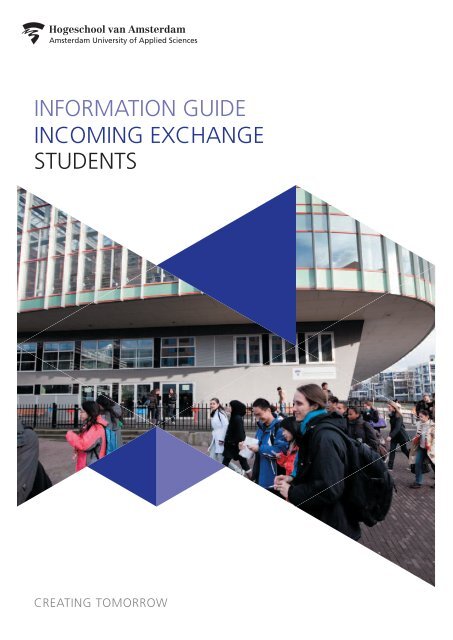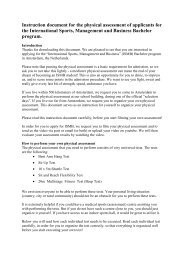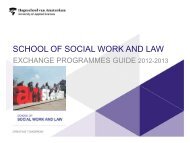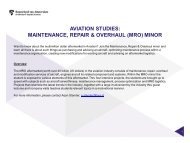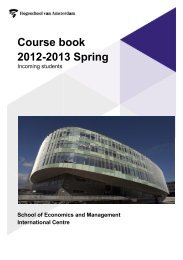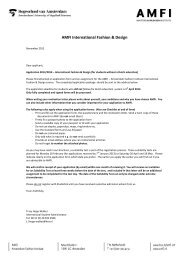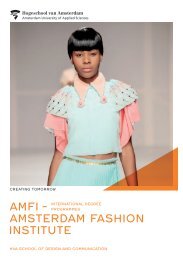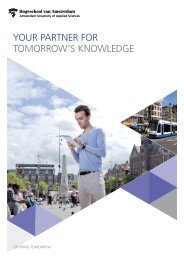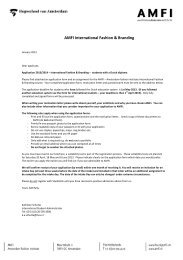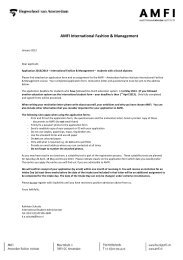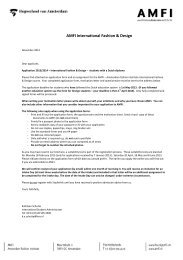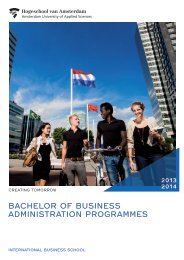InformatIon guIde IncomIng exchange StudentS - Hogeschool van ...
InformatIon guIde IncomIng exchange StudentS - Hogeschool van ...
InformatIon guIde IncomIng exchange StudentS - Hogeschool van ...
You also want an ePaper? Increase the reach of your titles
YUMPU automatically turns print PDFs into web optimized ePapers that Google loves.
Information guideIncoming ExchangeStudentsCreating tomoRrow
This is a publication of:<strong>Hogeschool</strong> <strong>van</strong> AmsterdamSchool of Economics and ManagementInternational CentreJuly 2011
Contents1. Welcome to the <strong>Hogeschool</strong> <strong>van</strong> Amsterdam 42. The Netherlands 73. International Centre 83.1 Services 83.2 Contact details 84. Exchange programmes at the School of Economics and Management 94.1 Exchange students 94.2 Admission requirements 94.3 Visa and Residence Permit 94.4 Credits and grading system 104.5 Dutch education system 114.6 Course registration 114.7 Lecture schedule and Academic Calendar 125. Facilities 135.1 Computer facilities 135.2 Buying readers and study books 135.3 Payments inside the building 135.4 Library and reading room 135.5 Administration offices 145.6 Restaurant and café 145.7 Sports and recreation 145.8 Student organisations 145.9 Student counselling, legal counselling and special needs 156. Accommodation 167. Arrival in Amsterdam 177.1 Arrival day 177.2 Introduction days 177.3 Registration with the Municipal Administration (GBA) 177.4 Directions 178. Practical information 198.1 Cost of living 198.2 Bank account 198.3 Financial matters 198.4 Public transport 208.5 Dutch language 208.6 Health and insurance 208.7 Important telephone numbers & addresses 21
Chapter 1Welcome to the <strong>Hogeschool</strong> <strong>van</strong> AmsterdamThe <strong>Hogeschool</strong> <strong>van</strong> Amsterdam (HvA) is a university ofapplied sciences with several locations across the cityof Amsterdam. The university has 7 schools, offeringacademic programmes to a total of 40,000 students. TheHvA is one of the largest comprehensive universities ofapplied sciences in the Netherlands. One of its largestschools is the School of Economics and Management(SEM). The SEM offers a wide variety of programmes ineconomics, business studies and related disciplines.Founded in 1867, the School of Economics and Managementhas approximately 14,000 students, making it one of the largestinstitutions of its kind in the Netherlands. It prides itself on along history of first-rate business education. The internationaldepartment houses approximately 2,600 students. In October2004, the former HES merged with the <strong>Hogeschool</strong> <strong>van</strong>Amsterdam, and the School of Economics and Managementbecame the largest school in this multidisciplinary Universityof Applied Sciences. Unlike traditional universities, the HvAhas always emphasised the practical application of theoreticalknowledge. At SEM, students are trained to take up middleand upper-management positions in organisations in boththe private and public sectors. Graduates earn a Bachelor ofBusiness Administration degree. In acknowledgement of thegrowing importance of the globalisation of markets, our school isconstantly adapting and developing its business courses to suit newinternational dimensions and demands.The school is located in the business area of Amsterdam in anew, modern building next to the Ajax football (soccer) stadium,Amsterdam ArenA. Living and studying in Amsterdam is aunique experience. The city is a colourful centre of culture and4
entertainment, with some 800,000 inhabitants of many differentorigins and cultural backgrounds. Amsterdam is famous not onlyfor the beauty of its architecture, but also for the relaxed andfriendly atmosphere among its population. Amsterdam is a truestudent city, with over 110,000 students.broader context of the city of Amsterdam. This information guidewill inform you of the most important facts and proceduresregarding enrolment as an <strong>exchange</strong> student and informationabout living in the Netherlands. This ensures that you can make themost of your stay.Amsterdam is a city with many faces. It is a unique historical city,with impressive buildings along the ancient canals and worldfamouscultural attractions, such as the Rijksmuseum and the VanGogh Museum. Amsterdam feels like a metropolis, but in facteverything can easily be reached by bike. Amsterdam’s centrallocation, with easy access to Schiphol Airport and the Port ofAmsterdam, makes it the ideal gateway to Europe. Brussels, Paris,Madrid, London and Berlin can all be reached within a matterof hours. Many large companies have their headquarters inAmsterdam, including ABN Amro, Heineken, TomTom and Philips.The international <strong>exchange</strong> students will benefit from themulticultural environment, both within our institute and in theWe hope that this guide will answer all your questions. If not,please do not hesitate to contact us.We hope you will enjoy your time at the School of Economicsand Management. We will do our best to make your stay here asrewarding and as pleasant as possible.Kind regards,International Centre<strong>Hogeschool</strong> <strong>van</strong> Amsterdam (HvA)University of Applied SciencesSchool of Economics and Management5
Chapter 2The NetherlandsThe history of the Netherlands as an independent nationbegan in 1568, when the province of Holland led thecountry into a war of independence against the Spanishempire, in defence of religious and economic freedom.Independence was declared in 1581, and in 1648, thenation gained international recognition as the Republicof the United Provinces of the Netherlands. In 1813, afterthe French occupation, the Netherlands became a unifiedstate and a constitutional monarchy under King Willem Iof Orange.The royal familyWhen the Netherlands became a monarchy in 1813, it wasruled by the House of Orange. Today, the reigning head ofstate is Queen Beatrix. Her eldest son, Prince Willem-Alexander,is heir to the throne. The Dutch constitution states that themonarch has immunity and that the ministers are responsible forgoverning the country.GeographyThe Netherlands has a population of about 16 million people,making it the most densely populated country in Europe. Thecountry is situated in the northern part of Western Europe,bordered by Belgium, Germany and the North Sea. By car, itwould only take you four hours to drive from north to south.Amsterdam is the capital, although the seat of government is inThe Hague (Den Haag).Wet feetThe western and northern parts of the country are between oneand six meters below sea level. The soil here is mostly peat and claydissected by canals, rivers and estuaries. Most of the land is usedfor farming or grazing. The territories below sea level used to belakes or part of the sea. Pumping stations and mills have drainedthem dry. The stations are always running to prevent flooding,while the coastal areas are protected by natural dunes as well asman-made dikes. The Flevopolder and the Noordoostpolder are thetwo polders most recently reclaimed from the sea. These regionswere reclaimed as part of the country’s never-ending battle againstthe sea. After reclamation, the land was divided into lots. After1953, when the province of Zeeland was hit by a disastrous flood,the Delta Works were conducted to straighten and strengthen theshoreline by constructing new dikes, dams, sluices and bridges.ClimateThe Netherlands has a maritime climate with moderatevariations in temperature between the four seasons. July andAugust are at one end of the scale, with average temperaturesbetween 20 and 25 degrees Celsius. The winter months are atthe other end of the scale, with some frost and snow.Dutch societyThe Netherlands is traditionally a trading country, and has hada very strong economy for many centuries. Trade, logistics,agriculture, banking and food have been leading drivers ofthe Dutch economy. The central location of the Netherlandsgives it prime access to international markets, and the Portof Rotterdam is the largest port in Europe. The Netherlandsis a multicultural society, particularly in the cities. Amsterdamhosts 178 different nationalities, more than any other city inthe world! This multi-ethnic mix emerged during the twentiethcentury, when many people from the former Dutch colonies inIndonesia, the Moluccas, Surinam and the Dutch Antilles cameto live in the Netherlands. In the 1950s and 1960s, southernEuropeans, Moroccans and Turks came here to ease theshortage of factory workers. Refugees from all over the world,as well as other groups of immigrants, complete this diversecultural picture.More information about studyingin the NetherlandsTo get a better idea what it is like to study in the Netherlands,the film Study in Holland has been developed. You can watch itat www.youtube.com/studyinholland.7
Chapter 3International Centre3.1 ServicesThe International Centre of the School of Economics andManagement provides a variety of services to our students.The International Services department is divided into anOutgoing Team and an Incoming Team.The Outgoing Team provides services for SEM students whowill be completing one or two semesters abroad at one of ourpartner schools. They can be contacted for all administrativeprocedures and advice about practical matters regarding theinstitutions and countries.The Incoming Team takes care of, among others, admission,accommodation in Amsterdam, visa and residence permits andintroductory activities for our incoming <strong>exchange</strong> students.If you have any questions during your <strong>exchange</strong> period inAmsterdam, please contact one of the Incoming Team’sInternational Relations Officers or visit our service deskduring opening hours.3.2 Contact detailsRoom: 4.109 (office) and 4.093 (service desk)Service desk opening hours:Monday to Friday from 09:00 - 13:00 hrsIncoming Team email address: incoming.sem@hva.nlOutgoing Team email address: outgoing.sem@hva.nlWebsite: www.international.hva.nlVisiting addressInternational CentreRoom 4.109Fraijlemaborg 1331102 CV Amsterdam ZuidoostThe NetherlandsPostal addressP.O. Box 225751100 DB Amsterdam ZuidoostThe NetherlandsTel: +31 (0)20 523 69 60Fax: +31 (0)20 620 68 018
Chapter 4Exchange programmes at the Schoolof Economics and ManagementExchange students can opt for the Fall semester, theSpring semester, or the full academic year. The academicyear runs from August to July. The Fall semester runs fromthe end of August to the third week in December, and theSpring semester runs from the end of January to mid-July.Exams for the Fall semester are held before Christmasin order to allow students to travel home in time (resitexams are held in January).4.1 Exchange studentsAn <strong>exchange</strong> student is a student who studies for one or twosemesters in the third year of their studies, generally underthe terms of a bilateral agreement between the SEM andthe student’s home institute. Most of them stay for only onesemester. The same lecture programme is offered in bothsemesters (with some exceptions). The semester-based, modulestructuredcourses seek to offer foreign students a challenginglearning experience, with a mixture of business courses, roleplays, language training and courses dealing with Europeanintegration.4.2 Admission requirementsExchange students must obtain approval from theirhome institute for the <strong>exchange</strong> at SEM. For the applicationprocedure, all <strong>exchange</strong> students must fill in the applicationform, which can be found on our website atwww.hva.nl/sem-application.Be sure to include:1. A clear copy of your valid passport (the pages with yourphotograph, your name, nationality, signature, date ofissue and date of expiration of the passport).2. Two recent passport photographs, with your name clearlywritten on the back. We will use these for your student card.3. A transcript of records of your home institute.4. A photocopy of your international medical insurancecertificate.DEADLINES FOR APPLICATIONFall semester: 1 MaySpring semester: 1 NovemberPlease send your completed application formand other required documents to:<strong>Hogeschool</strong> <strong>van</strong> AmsterdamSchool of Economics and ManagementInternational Centre, Room 4.109INCOMING TEAMP.O. Box 225751100 DB AmsterdamThe NetherlandsWe are unable to accept copies of forms:please submit originals only!4.3 Visa and residence permitThe immigration officer from the General Office StudentAffairs handles visa and residence-permit applications. Uponacceptance, the immigration officer will contact the <strong>exchange</strong>students directly about the procedures.Visa (MVV) applicationWhether you will need an MVV or not depends on yournationality:You need an MVV if you are not a citizen of one of the EU/EERcountries, Switzerland, Liechtenstein, Monaco, Iceland, Norway,Sweden, the USA, Canada, Australia, New Zealand, South Korea orJapan. If you are still uncertain about the status of your nationalityin this respect, feel free to contact the International Centre.Residence permitAll students entering the Netherlands with an MVV will need toapply for a residence permit. Students from the USA, Canada,Japan, New Zealand, South Korea and Australia do not needan entry visa, but must still apply for a residence permit afterarrival.9
IMPORTANT NOTE FOR STUDENTS WITH THE CHINESENATIONALITYAll students with the Chinese nationality must comply with anumber of extra requirements before their visa application isapproved. This measure has been taken by the DutchEmbassy. Nuffic will carry out the extra inspection. The inspectionwill consist of two parts: verification of the student’sdiplomas & validity of the student’s IELTS test/TOEFL IB test.to promote student mobility. It created an internationallyrecognised standard for describing and weighting courses inorder to facilitate student <strong>exchange</strong>s. The ECTS system is basedon the complete workload of the average student, includinglecture attendance, practical work, personal study time andexam revision. In the ECTS system, one credit represents a28-hour working week, and the standard workload for onesemester is 30 credits.Chinese students are required to take the IELTS test or theTOEFL IB test. The minimum score required for the IELTS test is6.0 (with no scores of below 5.5), and the minimum score forthe TOEFL IB-test is 80.Please note that if you fail to send in the necessary forms ordo not meet the requirements, the School of Economics andManagement cannot process your application. This could meanthat your request for accommodation and/or the MVV visa isput aside until further notice and that your visa may be issuedlate or not at all.Grading systemIn the Dutch grading system, which is used at the School ofEconomics and Management, grades are awarded on a scalefrom 1 to 10, with 1 representing the worst possible result and10 representing the best. The minimum passing grade is 5.5.Only round figures will be reported on your grade list.For example, a grade between 6.0 and 6.4 will be roundeddown to a 6, while a grade between 6.5 and 6.9 will berounded up to a 7.Passing grade: 5.5 – 10Failing grade: 1 – 5.4More information about the MVV and the residence permit canbe found on our website: www.hva.nl/sem-visa.4.4 Credits and grading systemECTS creditsECTS stands for ‘European Credit Transfer System’, and wasdeveloped as part of European Union (EU) programmes1 = extremely poor 6 = satisfactory2 = very poor 7 = good3 = poor 8 = very good4 = unsatisfactory 9 = excellent5 = almost satisfactory 10 = outstanding(NB: 5.5 is the lowest passing grade)10
4.5 Dutch teaching systemThe Dutch teaching system includes more contact hours perweek than any other university system. Despite this, students arestill expected to spend a significant amount of time on privatestudy, using the library and computer sources.The amount of time this takes in addition to class attendancecan be quite substantial. The majority of lectures are held inclassrooms rather than lecture halls, in groups no larger than35 students. This informal situation gives ample opportunityfor interaction between teachers and students, and opendiscussions are very common.Students are expected to attend the classes for which they haveenrolled. In practical courses (language or computer labs, casestudies) requiring active student participation, attendance ismandatory. Team spirit, an open-minded attitude and a certaindegree of self-discipline are key to completing the coursessuccessfully.Modules may include assessed coursework, such as essays,presentations or mid-term exams, but the final examinationscarry the highest percentage of the grade. Therefore, studentsshould aim to begin early with their revision for these exams inorder to avoid an excessive workload towards the end of thesemester.The modules form self-contained units, each with specific aimsand a separate grade and credit points. All subjects in themodule-structured programmes are taught either in blocks ofseven weeks or over fourteen successive weeks, interruptedby short holidays. Each semester is rounded off with oral andwritten examinations, usually held over a period of two weeks.4.6 Course registrationIncoming students will take courses from our international studyprogrammes. The School of Economics and Management offersfive bachelor programmes in English: International Businessand Management Studies (IBMS), International Business andLanguages (IBL), International Financial Management (IFM),International Management (IM) and Trade Management Asia(TMA). The courses which are offered to the incoming <strong>exchange</strong>students come from these bachelor programmes and are all partof the third or fourth year of study. 1We advise students to enrol for courses with a workload of nomore than 30 ECTS (maximum: 35) per semester.Course enrolments and scheduling are carried out simultaneouslyvia the intranet. Students can log in with their HvA ID andpassword, which are sent to the partner institutes and to eachindividual student by email. After the enrolment deadline, thetimetable is fixed: there is no ‘add/drop period’ once the semesterhas begun. For this reason, we advise you to consult your studyadvisor at your home institution before finalising your courseenrolment. In the case of urgent changes after the deadline haspassed, students will need to consult the International Centre.An updated version of the Course Book for Incoming ExchangeStudents for the entire academic year will be published on ourwebsite (www.hva.nl/sem-coursebook). The majority of thecourses are offered in both semesters, unless otherwise indicated.The range of courses offered is subject to change.Courses are taught in weekly blocks of two or three hourseach. Apart from attending lectures, students are expected tospend a considerable amount of time on preparation for classesand exams. Each block of two contact hours requires an equalamount of time of private study.English requirement:As all of the courses in the <strong>exchange</strong> programme are taught inEnglish, we rely on our partner institutes to ensure that studentswho come to study at our institute have a sufficient level ofEnglish (equivalent to IELTS 6.0 or TOEFL IB 80). Students areunlikely to pass their exams, or gain the necessary ECTS credits,if they do not possess this level of English language proficiency.We strongly recommend that all non-native English speakingstudents enrol in the EX1 English language course during their<strong>exchange</strong> programme at our institute. This EX1 course has beenspecially developed for this group of students.1In the Netherlands, bachelor programmes offered by universities of applied sciences last for four years.11
4.7 Lecture schedule and academic calendarLecture TimeLecture Hour08.30-09.20 109.20-10.10 210.10-11.00 311.00-11.50 411.50-12.40 512.40-13.30 613.30-14.20 714.20-15.10 815.10-16.00 916.00-16.50 1016.50-17.40 1117.40-18.30 12Lecture scheduleEach year, the current academic calendar is published on ourwebsite. Please check the dates when booking your flights.Class or exam schedules can not be adjusted due to a late arrivalor an early departure. We do NOT facilitate resit exams abroad.Fall semester:End of August – end of January(resit examinations included)Spring Semester:End of January – beginning of July(resit examinations included)Please be aware that it is NOT possible to start thestudy programme two weeks after the start ofthe lectures.Introduction period:Each semester is preceded by an introduction periodorganised by the International Student Network ofAmsterdam in which our incoming <strong>exchange</strong> studentscan participate.Visit our website for the complete academic calendar:www.hva.nl/sem-calendar12
Chapter 5Facilities5.1 Computer facilitiesAs a student of the School of Economics and Management,you may use the computer facilities provided by our school.You will need your HvA ID and password for this. The HvA IDand password will be sent to you after you have been admitted.These will enable you to log into the student network andmake use of the intranet and internet. You will have your ownpersonal page on the intranet. If you have any questions relatedto the computer facilities, you can go to the ICT helpdesk on theground floor.The administration staff and lecturers use the intranet for moststudent communications. On the intranet, you can register foryour courses and exams, view your timetable, make timetablealterations, view your exam results and find specific informationrelating to your courses, as well as study programmes,regulations and other important matters relating to the Schoolof Economics and Management. You will also be informed ifany lecturers are absent. As of this academic year, some of thisinformation will also be available for smartphones. Several appshave been developed to keep students informed about thelatest timetable changes and absences.There are several locations in the building (e.g. the library andthe project areas on the third and fourth floors) where you canuse computers or where you can log in with your laptop. Beforeyou are able to do so, you will need to bring a wireless card tothe ICT helpdesk on the ground floor. The programmes used atSEM are Office 2007 and Windows XP (among others).5.2 Buying readers and study booksStudents at the HvA can order study material online at OcéHvA weblisher. All the instructions can be found at hva.oce.nl.Readers ordered by students at the Fraijlemaborg location canbe collected from the Repro Department, located on the firstfloor, in room 1.030 (on the corridor behind the bookshop).Study books can be bought at the Study Store on the first floor.where you can also pay with your debit card. It is not possibleto pay with cash or credit card! In addition, the copy machine,telephones and faxes inside the school building only work withChipknip cards. A Chipknip card is a banking card that containsa special chip, which you will receive automatically when youopen a Dutch bank account. You can also buy a disposable chipcard at our Student Administration Office (room 1.010). Duringthe introduction days, the International Centre will be availableto help students to open a bank account.5.4 Library and reading roomRoom:0.043 (ground floor + first floor)Opening hours: Monday to Thursday 8.30 – 18.00 hrsFriday 8:30 – 17:00 hrsEmail:mediatheekfb@hva.nlLibrary website: www.bib.hva.nlTel: +31 (0)20 523 60 46The library stocks all of the compulsory literature as well asother business and management-related topics. One copy ofthe compulsory literature is always available in the library, butcannot be borrowed or used outside the library. The majorityof the collection can be borrowed, except for newspapers andjournals. The available newspapers and journals include theFinancial Times, the Wall Street Journal, Handelsblatt, Le Figaro,El País, The Economist, Harvard Business Review, Businessweekand Der Spiegel.Besides a physical collection, the library also has a digitalcollection. It includes Business Source Premier and ScienceDirect (journal article databases), LexisNexis and PressDisplay(newspaper articles), Euromonitor (statistics, country and marketinformation) and two e-book databases: Netlibrary and SafariBooks Online.Facilities available within the library include computer terminals,photocopiers, printers and scanners and a silent study area.5.3 Payments inside the buildingPayments in the school building can only be made with a socalled‘Chipknip’ card. The only exception to this is the café,You are always welcome to ask any questions you mighthave regarding the library/digital library at the library’sinformation desk.13
5.5 Administration officesStudent Administration OfficeRoom: 1.010Opening hours: Monday to Friday from 10:00 – 14:00 hrsEmail:sa-fmb@hva.nlFor matters regarding changes of address, formal statementsof admission, Chipknip cards etc., please apply to the StudentAdministration Office in room 1.010. Please let us know if youraddress in your home country or the Netherlands has changed.Result Administration OfficeRoom: 1.008Opening hours: Monday to Friday from 10:00 – 14:00 hrsEmail:ra-fmb@hva.nlYou can consult this office for information on examinationresults, the registration of grades and credits, administrativematters regarding your exams, and other practical everydaymatters, such as changes in course schedules.5.6 Restaurant and caféRestaurantLocation: First floor, next to the escalatorsOpening hours: Monday to Thursday from 09:00 – 15:00 hrsFriday from 09:00 – 14:00 hrsThe restaurant in the school building serves all kinds of hotand cold food. The entrance to the restaurant is situated onthe first floor.CaféLocation: Ground floor, next to the reception deskOpening hours: Monday to Friday from 08:00 – 16:30 hrsOn the ground floor, to the left of the reception, you willfind the café. All kinds of hot and cold drinks and snacks areavailable here.5.7 Sports and recreationStudents can take part in a number of sports at very reasonableprices at the University Sports Centre.USC (University Sport Centre)Science Park 3061098 XH AmsterdamTel: +31 (0)20 523 89 55For more information, visit www.usc.uva.nl.5.8 Student organisationsInternational Student Network (ISN) AmsterdamISN Amsterdam is a student-run non-profit organisation forinternational students of the HvA and UvA. It is part of theErasmus Student Network (ESN), which is a large internationalorganisation of student networks throughout Europe, andwas founded in Utrecht (the Netherlands) in 1990. They aimto facilitate the social and cultural integration of internationalstudents in Dutch society, and Amsterdam in particular. Theyorganise introduction periods, parties, drinks receptions,weekend trips, excursions and other cultural and sportiveactivities. For more information, visit www.isn-amsterdam.nl.14
BabylonixBabylonix is the student association for the students of theSchool of Economics and Management. The board is composedof students studying at our university. Besides social activities,they also organise book fairs. On their website, you can findmock exams to help you prepare for your exams.For more information, visit www.babylonix.nl.5.9 Student counselling, legal counselling andspecial needsDuring their stay, we support our international students not onlywith assistance in practical matters such as housing, visas andresidence permits, but also by offering counselling to help withtheir studies and sociocultural affairs.Student counsellingIn case of special needs or problems, please contact the staff atthe International Centre. In the event that they cannot help you,you will be referred to the student counsellor who deals withinternational students.Student Counsellor (Fraijlemaborg Location):Ms F.A. PeperRoom: 4.067Consulting hours: Monday, Tuesday, Thursday and Fridayfrom 10:00 – 11:00 hrsOther hours by appointment only.Tel: +31 (0)20 523 64 31Email:f.a.peper@hva.nlSpecial needsAbout 6% of the students at HvA suffer from a disability or achronic disease including physical impairments, RSI, asthma,diabetes, and various kinds of learning disabilities such asdyslexia and ADHD.If your disability or illness is causing you problems whenstudying, attending classes, or finding accommodation, or if youexpect that it will in the future, you should contact your studentcounsellor, Ms F.A. Peper, for advice or information aboutpossible services. We strongly advise you to contact the studentcounsellor before enrolling at the HvA. In order to have anyadjustments made, you need to have a medical report. If youdon’t have one or if you have any questions about this, pleasecontact Ms F.A. Peper.Legal counsellingStudents can get free legal advice from students studying atthe School of Social Work and Law. They run a consultancyservice in the James Wattstraat (Europahuis), at no. 77-79, room2.05. This is very close to Amstel Station. You must make anappointment first by calling + 31 (0)20 595 28 68 (from Mondayto Thursday, 09:00-17:00 hrs) or by sending an email tohjs@hva.nl.15
Chapter 6AccommodationThe School of Economics and Management offers housingfacilities to its <strong>exchange</strong> students in Amsterdam for one ortwo semesters via a contract with two housing corporations inAmsterdam (DUWO and De Key). Rooms are available for one ortwo semesters at different locations in Amsterdam.You can either opt for a single room with private facilities (thenyou have your own bedroom and your own kitchen, bathroomand toilet), or you can rent a single room with shared facilities(then you have your own bedroom and you share the kitchen,bathroom and toilet with 1, 2 or 3 other students). All roomshave an internet connection. The rental prices vary between€€350 and €€500 p/m.Rooms will be allocated subject to availability. The housingcorporations will try to meet students’ requirements for eithershared or single accommodation when allocating the rooms, butcannot guarantee that everyone’s preference will be realised.Please note that the rental period for the housing is for afixed period. It is not possible to get a refund if you arrive inAmsterdam later, or if you return to your home country beforethe end of the rental period. Signing the rental contract showsthat the student is in agreement with the rental conditions.Further details about accommodation can be found on ourwebsite (www.hva.nl/sem-accommodation).16
Chapter 7Arrival in Amsterdam7.1 Arrival dayAn official arrival day is organised for students who rentaccom modation via the housing corporations associated with SEM.Students who arrive during the weekend or outside office hourswill need to arrange their own accommodation for the weekendor night. There are several hostels in Amsterdam. For moreinformation about hostels in Amsterdam, you can go towww.hostelsclub.com or contact the tourist board inAmsterdam www.amsterdam.info/accommodation.If you are unable to come to the arrival day, please contactthe International Centre for further instructions. They can becontacted by e-mail at incoming.sem@hva.nl or by phoneon +31 (0)20 523 69 60.7.2 Introduction daysStudents should arrive at least one week before lectures start inorder to attend the introduction programme. The introductionprogramme is organised by the International Centre inco-operation with the International Student Network (ISN)and Babylonix business students network. It will include:--An explanation of residence permit procedures, registrationwith the municipality of Amsterdam, opening a bankaccount and other information sessions--A general assembly welcome meeting, and separatemeetings with International Centre staff--Tours and social events--A welcome partyThe introduction programme is free of charge and is highlyrecommended as a way to get to know the School ofEconomics and Management, Amsterdam and your fellow<strong>exchange</strong> students.Information about the International Student Network (ISN) canbe found at www.isn-amsterdam.nl.Information about Babylonix can be found atwww.babylonix.com.The exact dates of the introduction period and arrival day will becommunicated by the International Centre via email.7.3 Registration with the MunicipalAdministration (GBA)All students are obliged to register their address details at theirlocal Municipal Administration (GBA). In Amsterdam, the DienstPersoonsgegevens (DPG – Personal Details Service) takes careof this registration. For those who are going to study at theSchool of Economics and Management, an appointment withthe DPG Amsterdam will be arranged. Please remember tobring your passport (with registration sticker if you have madeyour visa application) and your rental contract. If you will bestaying in the Netherlands for longer than one year, then youalso must bring your birth certificate. This registration in theMunicipal Administration also serves as your application fora BSN (Burgerservicenummer - Citizen Service Number). Youneed this number to work, open a bank account or make useof a healthcare service (for example, a doctor or hospital) in theNetherlands.7.4 DirectionsDue to the large number of students arriving, we areunfortunately not able to offer a pick-up service. Students areexpected to get to the apartment buildings and the School ofEconomics and Management building (Fraijlemaborg 133) bythemselves. The Netherlands has excellent public transport andbelow you will find directions for different locations.How to get to the School of Economics andManagement by public transportYou can use the following journey planner to see howto get to your destination by public transport:www.journeyplanner.9292.nl. The address of the Schoolof Economics and Management is Fraijlemaborg 133,Amsterdam.Please note: The school building is just between the “BijlmerArenA” and “Strandvliet” metro stations. The walking distanceto the School of Economics and Management building is thesame from both stations.Train: The School of Economics and Management is withinwalking distance (approximately 5 minutes) from theBijlmer ArenA train and metro station.17
Metro: Direct metro connections (lines 50 and 54) run regularlybetween Bijlmer ArenA station, Amstel Station andCentraal Station in Amsterdam. Get off at eitherStrandvliet or Bijlmer ArenA station. The school buildingis within walking distance (approximately 5 minutes)from the Bijlmer ArenA train and metro station.From Strandvliet metro station: At the bottom of the stairs,turn towards the apartment buildings. This is the BorisPasternakstraat. Turn right and walk approximately 200metres until you reach the traffic lights. Across the street, onyour left-hand side, you will see the School of Economics andManagement building.From Bijlmer ArenA train and metro station: At the bottomof the escalator, turn right towards Amsterdamse Poort. Justbefore the Nieuw Amsterdam office building, turn left and thenwalk straight ahead. You will then see the school building onyour right-hand side.How to get to the School of Economicsand Management by carThe school building is located in the vicinity of various majormotorways, including the A1, A2, A9 and A10.On all of thesemotorways, simply follow the blue ANWB Transferium signs.Follow the road into the tunnel under the Amsterdam ArenA(do not drive into the P+R Transferium). Turn right at the firstroad after leaving the tunnel.18
Chapter 8Practical informationFor practical information, please see thefollowing websites:<strong>Hogeschool</strong> <strong>van</strong> Amsterdam: www.international.hva.nlStudying in Holland:www.studyinholland.nl orwww.nuffic.nlInformation about Amsterdam: www.iamsterdam.nl8.3 Financial mattersThe euro (€)Since 1 January 2002, the euro has been the official currency inthe following countries within the EU: Belgium, Germany, Finland,France, Ireland, Italy, Luxemburg, the Netherlands, Austria,Portugal, Spain, Greece, Slovakia, Slovenia, Cyprus and Malta.8.1 Cost of livingExperience has shown that students living and studying in Hollandfor one year spend between €700 and €1,000 a month.The amounts given below are only intended to give someindication of the expenses of a single student. They may varywidely based on your personal budget and lifestyle.Food:approximately €200 per monthRent:€400-600 per monthPublic transport: approximately €60 per monthStudy books and readers: €400 - €600 per semesterEating out or going out: €25 - €50Cinema: €10 - €15Music events: €25 - €758.2 Bank accountUpon arrival in Amsterdam, all <strong>exchange</strong> students will receiveinformation on how and where to open a bankaccount in the Netherlands. SEM has made specialarrangements for this with a bank in the Netherlands. The bankcard also contains a ‘Chipknip’ chip, which will enable you topay within the building.In order to open a bank account, all students need a SocialSecurity Number (known as the burgerservicenummer or BSN).The BSN will be issued by the Municipality of Amsterdam.The International Centre will help foreign students with theirregistration at the Municipality of Amsterdam. Registrationat the Municipality Office of Amsterdam is mandatory for allstudents who stay longer than 4 months in Amsterdam.Please bear in mind that it will take a couple of weeks beforeyou will be able to use your Dutch bank account, so be sure thatyou will have sufficient money with you for your first weeks inAmsterdam.Paying in cash is still common practice, but nowadays debit orcredit cards are becoming more widely accepted for anythingabove €15. NB: Some restaurants do not accept credit cards,however high the bill may be! ATMs can be found throughoutthe centre, and most of them accept the major credit cards. Inaddition, there are many small <strong>exchange</strong> offices in the centre,which will convert your foreign currency or traveller’s chequesinto euros (for a small fee). Tipping is common in restaurantsand in bars. As a rule, a tip of between 5 - 10% should suffice.Currency <strong>exchange</strong> officesAmsterdam has many currency<strong>exchange</strong> offices. One of thelargest companies is GWK. At GWK offices, not only can you<strong>exchange</strong> foreign currency, but also buy/cash traveller’s cheques,arrange travel insurance, cash euro cheques and provide cashon-cardservices for practically all credit cards. There are GWKoffices at railway stations and at Amsterdam Schiphol Airport.Some GWK offices are open 24 hours a day. Most offices areopen seven days a week, from early in the morning to late atnight. For more information, visit www.gwk.nl.Credit cardsAll major credit cards are widely accepted, but don’t takethis for granted. If in doubt, ask in ad<strong>van</strong>ce. Cash-on-cardservices are available for selected American Express, DinersClub, MasterCard and Visa cards. All GWK currency <strong>exchange</strong>outlets and Change Express offices also accept these cards. Itis not unusual to be asked for ID when paying with a creditcard in shops. You may also need to enter your credit card’s PINnumber. It is not very common to pay with a credit card whenyou purchase an inexpensive item.19
ATMYou can get money from a cash dispenser with your foreignbank pass, provided your pass has a Cirrus logo, or with yourcredit card. At some ABN-Amro cash dispensers, the PLUS logois also accepted. Also check your card and the ATM for EDC, ECand Maestro logos.8.4 Public transportThe ‘OV-chipkaart’ (Public Transport Chip Card) is the new meansof payment for the public transport system in the Netherlands.The OV-chipkaart can be loaded with credit in euros with whichyou can travel anywhere within the Netherlands. The card isavailable at all train stations and on the website. There aredifferent kinds of cards which vary in price and use. Visit thewebsite www.ov-chipkaart.nl for more details.To find out more, you may like to visit thefollowing websites:www.smartphrase.com/Dutch/du_general_words_phr.shtmlwww.dutchlanguage.info/dutch/phrases.aspwww.linguanaut.com/english_dutch.htm8.6 Health and insuranceHealth careStudents who are enrolled at the School of Economics andManagement and who are resident in Amsterdam can registerwith the university doctors. Registering for this service does notsubject you to any obligations: it only ensures that you haveaccess to a general practitioner (GP) in Amsterdam.Please complete the following form online:www.hva.nl/sem-gp.For more information about public transport (metro, bus, andtram) in Amsterdam, visit www.gvb.nl. For more informationabout trains in the Netherlands, visit the NederlandseSpoorwegen (the Dutch railway company) website atwww.ns.nl.Please note: When using public transport facilities, you may beasked to show your ticket by a ticket controller. If you are not inpossession of a valid ticket, you risk a fine of approximately€35. Under Dutch law, you are obliged to show your identificationdocument (passport, ID card or drivers license) if asked bypolice or similar figures of authority. If you cannot show your IDdocument, the police can issue you with a €60 fine! You shouldtherefore make sure you always have an identification documentwith you.8.5 Dutch languageFor European students, it is possible to follow an ErasmusIntensive Language Course (EILC) which is offered by a numberof Dutch universities. For more information, please visit theNuffic website (www.nuffic.nl). It is also possible to takea beginner’s Dutch course at the School of Economics andManagement as part of their course preparation.InsuranceAll students must arrange their own health insurance beforeleaving their home country. Please check that repatriationof remains and medical evacuation to the home country arecovered by your insurance, and ensure that your insurancehas international coverage. The School of Economics andManagement is not responsible for students who are notinsured!Insurance for third party liability, accident, theft, householdeffectsWe advise all students to check that their insurance coverstheft (including theft from the student accommodation), loss ofbelongings, and liability (third-party coverage). Please consultyour own insurance company at home about this. If you arelooking for a good Dutch insurance policy, please visit thewebsite of IPS/Lippmann group (www.ips-lippmann.com/ips)for more details. You can also visit the Aon Student Insurancewebsite at www.students-insurance.eu.20
AccommodationStichting DUWO (student housing organisation) (020) 543 1100Address: Uilestede 108, 1183 AM AmstelveenOpening hours: Monday to Friday, 08:30 – 17:00 hrsEmail: shortstayamsterdam@duwo.nlWebsite: www.duwo.nlIn case of technical problems or repairs (020) 342 9666De Key (student housing organisation) (020) 621 4333Address: Hoogte Kadijk 179, 1018 BK AmsterdamOpening hours: Monday to Friday, 08:30 – 16:30 hrsEmail: shortstay@dekey.nlWebsite: www.shortstay.dekey.nlHealthDoctor/General Practitioner (GP) (020) 525 2878UvA/HvA Studentenartsen/Student Health ServiceAddress: Oude Turfmarkt 151 (near the Munttoren in the city centre)Emergencies during office hours (020) 525 2889Emergencies outside office hours and at weekends (088) 003 0600Please note that before you go to the Student Health Service, you must be registered.This registration should be done online at www.hva.nl/sem-gpHospitalsSint Lucas Andreas Hospital (020) 510 8911Address: Jan Tooropstraat 164, AmsterdamAMC/Academic Medical Centre (close to the school building) (020) 566 9111Address: Meibergdreef 9, Amsterdam ZuidoostOLVG (Onze Lieve Vrouwen Gasthuis) Hospital (020) 599 9111Address: Oosterpark 9, Amsterdam (first-aid near centre of Amsterdam)DentistAcademisch Centrum Tandheelkunde Amsterdam (ACTA) (020) 598 0888Address: Gustav Mahlerlaan 3004, 1081 LA AmsterdamEmail: info@acta.nlWebsite: www.acta.nlGGDGGD (Municipal Health Service, also for vaccinations) (020) 555 5911Address: Nieuwe Achtergracht 100, 1018 WT AmsterdamFax: 020 - 555 52 77Email: info@ggd.amsterdam.nlWebsite: www.gezond.amsterdam.nl22
Lost luggageSchiphol airport 0900 724 4746Website: www.schiphol.nlKLM (Dutch airline) (020) 649 9123Website: www.klm.nlPublic transport in the NetherlandsGeneral information number for all public transport: 0900 9292Monday to Friday: 06:00 – 00:00 hrsSat/Sun/Public Holidays: 07:00 – 00:00 hrs (€ 0,70 p/m)Website: www.9292ov.nlNederlandse Spoorwegen (Dutch railway company)Website: www.ns.nlPublic transport in AmsterdamGVB: Amsterdam Public Transport (bus, tram, metro) (020) 551 4911GVB Customer Service0900 8011 (€ 0,10 p/m)Available daily from 08:00 – 22:00 hrsWebsite: www.gvb.nlInformation about bus services in AmsterdamWebsite: www.connexxion.nlTelephone and faxInformation about telephone/fax numbers in the Netherlands 0900 8008(€ 0.90 per inquiry, plus mobile phone costs if applicable)Information about telephone/fax numbers abroad (€ 1,15 per inquiry) 0900 8418NB: Not every telephone network provides this service.Tourist Office (VVV)Amsterdam Tourist Office (VVV)0900 400 4040 (€ 0,40 p/m)Opening hours: Monday to Friday, 09:00 – 17:00 hrs.Address: Stationsplein 10, Amsterdam (in front of the main entranceof Amsterdam Central Station)Website: www.iamsterdam.nlMunicipalityMunicipal Administration (GBA) Amsterdam (020) 624 1111Address: Stadhouderskade 85, 1073 AT Amsterdam23
<strong>Hogeschool</strong> <strong>van</strong> AmsterdamSchool of Economics and ManagementFraijlemaborg 1331102 CV Amsterdam Z.O.International Centre, room 4.109P.O. Box 225751100 DB Amsterdam Z.O.The NetherlandsT: +31 (0) 20 523 69 60F: +31 (0) 20 620 68 01E: incoming.sem@hva.nlW: www.international.hva.nl


